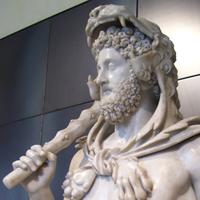Hercules I: FF 12-16
12. Ira Iunonis
Hercules, Alcmenae filius, olim in Graecia habitabat. Hic omnium hominum validissimus fuisse dicitur. At Iuno, regina deorum, Alcmenam oderat et Herculem adhuc infantem necare voluit. Misit igitur duas serpentis saevissimas; hae media nocte in cubiculum Alcmenae venerunt, ubi Hercules cum fratre suo dormiebat. Nec tamen in cunis, sed in scuto magno cubabant. Serpentes iam appropinquaverant et scutum movebant; itaque pueri e somno excitati sunt.
13. Serpentes
Iphicles, frater Herculis, magna voce exclamavit; sed Hercules ipse, fortissimus puer, haudquaquam territus est. Parvis manibus serpentis statim prehendit, et colla earum magna vi compressit. Tali modo serpentes a puero interfectae sunt. Alcmena autem, mater puerorum, clamorem audiverat, et maritum suum e somno excitaverat. Ille lumen accendit et gladium suum rapuit; tum ad pueros properabat, sed ubi ad locum venit, rem miram vidit, Hercules enim ridebat et serpentis mortuas monstrabat.
14. Linus
Hercules a puero corpus suum diligenter exercebat; magnam partem diei in palaestra consumebat; didicit etiam arcum intendere et tela conicere. His exercitationibus vires eius confirmatae sunt. In musica etiam a Lino centauro erudiebatur (centauri autem equi erant sed caput hominis habebant); huic tamen arti minus diligenter studebat. Hic Linus Herculem olim obiurgabat, quod non studiosus erat; tum puer iratus citharam subito rapuit, et omnibus viribus caput magistri infelicis percussit. Ille ictu prostratus est, et paulo post e vita excessit, neque quisquam postea id officium suscipere voluit.
15. Sacrificium
De Hercule haec etiam inter alia narrantur. Olim dum iter facit, in finis Aegyptiorum venit. Ibi rex quidam, nomine Busiris, illo tempore regnabat; hic autem vir crudelissimus homines immolare consueverat. Herculem igitur corripuit et in vincula coniecit. Tum nuntios dimisit et diem sacrificio edixit. Mox ea dies appetebat, et omnia rite parata sunt. Manus Herculis catenis ferreis vinctae sunt, et mola salsa in caput eius inspersa est. Mos enim erat apud antiquos salem et far capitibus victimarum imponere. Iam victima ad aram stabat; iam sacerdos cultrum sumpserat. Subito tamen Hercules magno conatu vincula perrupit; tum ictu sacerdotem prostravit; altero regem ipsum occidit.
16. Crudelitas
Hercules iam adulescens Thebis habitabat. Rex Thebarum, vir ignavus, Creon appellabatur. Minyae, gens bellicosissima, Thebanis finitimi erant. Legati autem a Minyis ad Thebanos quotannis mittebantur; hi Thebas veniebant et centum boves postulabant. Thebani enim olim a Minyis superati erant; tributa igitur regi Minyarum quotannis pendebant. At Hercules civis suos hoc stipendio liberare constituit; legatos igitur comprehendit, atque auris eorum abscidit. Legati autem apud omnis gentis sancti habentur.

